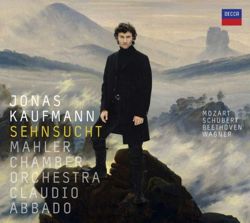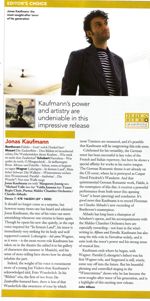|
|
|
|
|
|
|
|
| Gramophone, Awards issue |
| John Allison |
|
|
|
Kaufmann’s power and artistry are undeniable in this
impressive release |
Editor's Choice
|
|
 It
should no longer come as a surprise, but however many times one has heard
and admired Jonas Kaufmann, the size of his voice can seem astonishing
whenever one returns to listen again. Though he opens his new disc quietly,
in the rapt voice required for “In fernem Land”, his tenor is immediately
very striking for its body and well supported control. Lohengrin — bel canto
Wagner, as it were — is the most recent role Kaufmann has taken on in the
theatre (he added it to his gallery of characters this summer in Munich),
and his sense of story-telling here shows how he already inhabits the part. It
should no longer come as a surprise, but however many times one has heard
and admired Jonas Kaufmann, the size of his voice can seem astonishing
whenever one returns to listen again. Though he opens his new disc quietly,
in the rapt voice required for “In fernem Land”, his tenor is immediately
very striking for its body and well supported control. Lohengrin — bel canto
Wagner, as it were — is the most recent role Kaufmann has taken on in the
theatre (he added it to his gallery of characters this summer in Munich),
and his sense of story-telling here shows how he already inhabits the part.
Indeed, the weight of his voice is reminiscent more of a young Jon Vickers
than Kaufmann’s acknowledged idol, Fritz Wunderlich. In his “Bildnis” aria,
the first of two from Die Zauberflöte featured here, there is less of that
Wunderlich-like sweetness of tone by which most Taminos are measured, and
it’s possible that Kaufmami will be outgrowing this role soon.
Celebrated for his versatility, the German tenor has been successful in key
roles of the French and Italian repertory, but here he shows a special
affinity for works in his native tongue. The German Romantic theme is set
already on the CD cover, where he is portrayed as Caspar David Friedrich’s
Wanderer. And that quintessential German Romantic work, Fidelio, is the
centrepiece of this disc: it receives a powerful performance from both tenor
(his opening “Gott” is heart-piercing) and conductor. It’s good news that
Kaufmaim is to record Florestan on Claudio Abhado’s new recording of
Beethoven’s masterpiece.
Abbado has long been a champion of Schubert’s operas, and his accompaniments
with the Mahler Chamber Orchestra here are especially rewarding — not least
in the wind-writing in Alfonso und Estrella. Kaufmann has also sung the
title-role in Fierrabras widely, and it suits both the tenor’s power and his
strong sense of musical line.

Kaufmann ends where he began, with Wagner. Parsifal (Lohengrin’s father) was
his first Wagner role, and Siegmund is still, wisely, some way off into the
future. But his beautiful phrasing and controlled singing in the
“Wintersttirme” shows why he has become the most sought-after tenor of his
generation, and is a highlight of this exciting new release. |
|
|
|
|
|
|
|
|
|
|
|
|
|
|
|
|
|
|